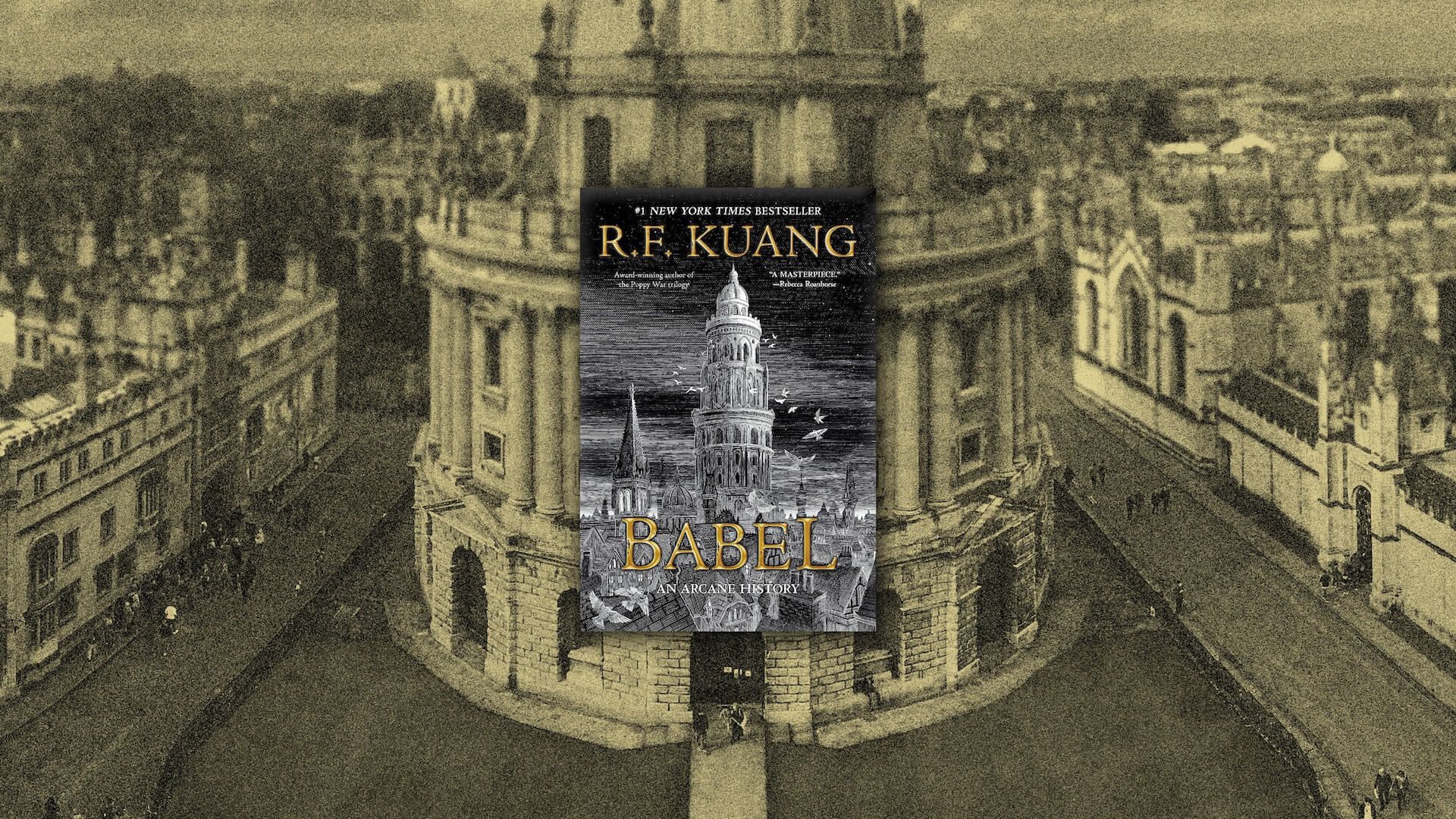This book left a lasting impression, and months later, I still think about it. It sparked a new and persistent pastime: looking up the etymology of words.

Babel is about a child, Robin, displaced from his homeland after his mother dies from cholera. British Professor Lovell offers him a more comfortable life in London, where he will train to enroll in Oxford University’s Royal Institute of Translation, known as Babel. Within Babel’s walls, the magic of this world is guarded closely. Enchanted bars of silver manifest the gaps in meaning between words in different languages.
There are many themes threaded throughout, some of which you might guess from the rest of the book’s title and subtitle, “or the Necessity of Violence: An Arcane History of the Oxford Translator’s Revolution”: racism, colonialism, language, identity, social change, and belonging.
I finished it in late January/early February (based on the dates logged with my highlights on my Kobo Libra H2O), and the book left an impression deep enough that I still think about it many months later.
I considered rereading the book so I might have the details fresher in my mind while writing about it. But having just finished The Invisible Life of Addie LaRue, a story where a woman cannot directly make a mark on the world and can only leave impressions and ideas in her wake, I thought that it might be worth recording the impressions Babel left on me even if I’m unsure of the details. This will be a record of the ideas it left in its wake, because Babel is a little like the character Addie LaRue—a source of inspiration that transcends its physical form.
When I think about Babel, I think of academia, the luster of the fine coat of paint on top of the imperfections of very human institutions, the way the idea that “these ivory towers are infallible” fades the more time you spend in them (assuming you haven’t succumbed to the seduction and sniffed the paint).
I think of Robin, how desperate he was to belong—to find family or a semblance of it in the wake of irreparable loss—of the slow march of resentment that he could never and perhaps, should never belong with people who considered those who looked like him to be lesser (but of course, Robin isn’t like them, because he is a model for who they could be, right?).
I think of friendships, of the ones that burn bright, so bright they explode in sound and fury, of the bonds forged through common (but not necessarily shared) struggle, and of the bonds severed because what set them apart could never be accepted or bridged.
But more than all of that—which is admittedly many more impressions than I thought Babel had left on me—the book drove home that language is but a human tool, created by human beings with motives and desires and used by human beings to further those motives and desires, often at the expense of other human beings. (But don’t worry, those human beings are not worthy of our consideration because they haven’t been educated and civilized. Once they have been, then of course, they too will be worthy of our consideration.)
Language, like every other human thing, is a paradox: both wonderful—a mechanism for collaboration—and terrible—a mechanism for subjugation. Friendship—wonderful for companionship, terrible for inclusivity. Institutions—wonderful for protecting a way of life, terrible for protecting many ways of life. The central premise of Babel, that there is possibility for creation and destruction in every spell we cast, with every word we use, and that every word choice is an act of translation between one language—one context—to another is, of course, something of a paradox, too.
…the Latin translatio means to “carry across”. Translation involves a spatial dimension—a literal transporation of texts across conquered territory, words delivered like spices from an alien land. Words mean something quite different when they journey from the palaces of Rome to the tearooms of today’s Britain.
Professor Playfair (Babel, Chapter 6)
The act of translation happens all the time: between one person to another, between one language to another, between one period of time to another, between one culture to another, between any one experience to another. It can be a bridge or a powder keg that lies dormant awaiting just the right trigger, for the specific circumstances to destroy any possible reconciliation. And therein lies its magic and its power, as Babel so potently demonstrates.
Babel was the book I needed but didn’t know I needed when I first opened it. I can’t remember the last time I opened a book and found it so engaging I read nothing else or the last time I opened a book and found a mirror so clear it felt more real than real life. I definitely can’t remember the last time I opened a book and found in its pages questions so sticky, I think about them even when I am no longer thinking about the book:
- What has been lost in the act of translation?
- In what wars have these words played a part?
- As a user of words, how much responsibility do I bear for the impact they have on others?
The impressions Babel left on me are indelible, deepening an already deep interest in language, storytelling, and their form and function. Will it be as impressive for you as it was for me? I don’t know. But if you have even a passing interest in language and its power, Babel should find its way to the top of your reading list.
This book pushed all the right buttons for me. Page-turning action and revelations with characters that felt alive to me—real enough that I saw shades of people I’ve known, past and present. Plenty of footnotes with interesting linguistic asides. I loved it enough I hunted down R.F. Kuang’s other books—“Yellowface”[1] and “The Poppy War” series.[2]
This was my first of her books, and after thoroughly enjoying this book and “Yellowface,” I am certain I will always make time to read Kuang’s future releases.
Highlights 🔗
-
So you see, translators do not so much deliver a message as they rewrite the original. And herein lies the difficulty – rewriting is still writing, and writing always reflects the author’s ideology and biases. After all, the Latin translatio means “to carry across”. Translation involves a spatial dimension – a literal transportation of texts across conquered territory, words delivered like spices from an alien land. Words mean something quite different when they journey from the palaces of Rome to the tearooms of today’s Britain.
-
…we must proceed from the starting assumption that distortion is inevitable. The question is how to distort with deliberation.
-
Tytler recommends three basic principles… ‘First, that the translation conveys a complete and accurate idea of the original,’ said Victoire. ‘Second, that the translation mirrors the style and manner of writing of the original. And third, that the translation should read with all the ease of the original composition.’
-
Theory comes from the Greek theōria, meaning a sight or spectacle, whose root also gives us the word theatre.
Changelog 🔗
- 2023-12-14: Unearthed an older, more complete impression of the book that I’ve now incorporated into this one.
I’ll be writing an impression for this one eventually. It consumed me just as “Babel” did, but for very different reasons. ↩︎
I have read just the first so far. It is well-written, but intense. War isn’t something I enjoy reading about, and Kuang’s writing is so vivid that this book is good but not pleasurable to read. I do intend on reading the rest of the series at some point, though. ↩︎
